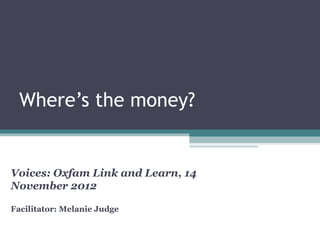Where is the Money?
- 1. Where’s the money? Voices: Oxfam Link and Learn, 14 November 2012 Facilitator: Melanie Judge
- 2. Framing questions • Where has the money gone? • What can/should we be doing to keep it here? • Do we need the money? What do we need it for? • How do we show value for money?
- 3. Session process • Unpacking the context (plenary) What factors have influenced the changes in donor/development funding • Critical considerations and future actions (small groups) • Feedback, discussion and debate (plenary)
- 4. Context • Global financial crisis • Shift in perception (South Africa) and changed donor priorities • Disproportionate affect on advocacy initiatives • Changed donor relationships/dynamics • Over-reliance on foreign donors? • Going local: unlocking resources from business, individuals, the State?
- 5. Takes us beyond the money question • Why who we are and what we do matters? • What is to be sustained, how and by whom?
- 6. Thinking critically • Thinking differently about sustainability • How we relate and with whom: communities, movements, State, funders • Defending the role of civil society: democracy building, accountability and public participation/agency • Making the case for advocacy, human rights and social justice organisations
- 7. What’s the change we are working towards?
- 8. How do we growing impact and demonstrate this, and to whom?
- 9. Balance internal and external pressures/tensions/priorities….
- 10. Links to communities and movements for change
- 11. Building organisations versus building organising
- 12. New funding approaches, relationship with money/resources
- 13. Where is the money? • What contextual factors (internal and external to your organisation) influence the current funding environment?
- 14. Small group discussions • What must we consider when thinking about the sustainability of the work? • What should we be doing? Who should be doing it?













